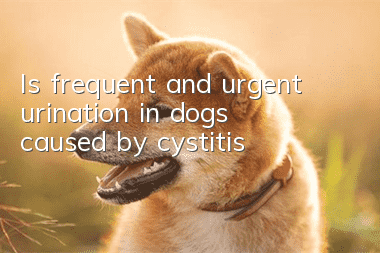Is frequent and urgent urination in dogs caused by cystitis?

Pets suffering from cystitis, frequent urination, and pooping everywhere are very troublesome. Cystitis refers to inflammation of the bladder mucosa and submucosa. It is mostly caused by pathogenic microorganism infection and is characterized by painful frequent urination and a large amount of bladder epithelium, pus cells, and red blood cells in the urine sediment. The main groups are female dogs and cats.
· Frequent urination/making urination postures
·Obvious pain during urination
· Small amount of urine/drip discharge
· Urine is turbid and has a strong odor
· Mixed with a lot of mucus/blood/blood clots (even white blood cells)
· Feeling pain when touching the bladder
· Fever, depression, loss of appetite, etc. (commonly spread to deep tissues in the later stage, and may be accompanied by nephritis or ureteritis)
How to diagnose?
·Urine test
It is divided into pyuria (turbidity), hematuria (brown and smelly), bacteriuria and fungiuria; when the four appear at the same time, it indicates a urinary tract infection.
· Blood test
Cystitis generally does not have an increase in white blood cells and a left shift of neutrophil nuclei; these changes can be distinguished from pyelonephritis or prostatitis.
· X-ray inspection
Complications such as urinary stones, tumors, urethral abnormalities, intravesical diverticula and chronic cystitis can be diagnosed.
If your dog suffers from recurring infections, microscopic examination of the urine sediment to look for crystals or an ultrasound scan of the bladder to check for stones, polyps, or even the possibility of cancer may be done.
Treatment methods:
· Improve your diet
Feed high-quality food that is non-irritating and nutritious. Ensure adequate and clean water sources and reduce the inhalation of high-protein foods.
·Clean the urination port
First rinse repeatedly with physiological saline, and then rinse with medicinal solution, such as 0.1% potassium permanganate solution (or 2% boric acid solution, 0.02% nitrofurazone solution), which can be used as a disinfection treatment; 1%-2% alum solution (or tanning solution) Acid solution) can be used for relief.
Note: Chronic cystitis can be cleaned with 0.02%-0.1% silver nitrate solution.
· Control secondary infection/eliminate inflammation
Antibiotics, quinolones, sulfonamides and antifungal drugs can be used.
· Severe bleeding
Use systemic hemostatic drugs, such as adrenochrome hydrazone (Anluoxue) 0.1-0.3 mg/kg body weight, 2 times a day; or ethylamine (hemostatic) 5-15 mg/kg body weight, 2 times a day, intramuscular injection .
Note: The above is only for reference. Specific medication needs to be given by a doctor after comprehensive diagnosis.
Preventing the occurrence of cystitis:
· Have regular bowel movements. Holding urine for a long time will only worsen the bladder infection;
· Do not drink tap water directly
· Don’t let your dog stay on the lawn for a long time, especially in dirty places
· Understand the health status of the breeding partner
· Clean the urinary opening and wipe it with a warm towel after each bowel movement
Warm Tips:
Parents need to note that if their baby develops new symptoms or still feels uncomfortable during treatment, please contact the doctor immediately to avoid recurrent cystitis; if the dog's condition improves during treatment, do not stop taking the medication, and follow the doctor's advice After completing the entire treatment process, please also pay attention to the hygiene of urination at all times.
- How to train a dog to sit down and not move? You need to repeat this training process!
- What are the best training methods for a two-year golden retriever?
- How to treat dog vomiting
- Will a dog die if he eats food with a small amount of cocoa powder?
- When is the best time to vaccinate puppies?
- The dog’s eyes are moist and he looks like he’s crying
- When the dog comes, how often does the aunt come and how many days does it take?
- Eight Reasons Why Dogs Lose Hair Severely
- Common sense issues about dog bathing
- Super sensitive dog's sense of smell, how to train a dog's sense of smell?



